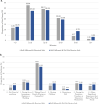Can Self-affirmation Encourage HIV-Prevention? Evidence from Female Sex Workers in Senegal
- PMID: 37195469
- PMCID: PMC10516782
- DOI: 10.1007/s10461-023-04039-7
Can Self-affirmation Encourage HIV-Prevention? Evidence from Female Sex Workers in Senegal
Abstract
We test an intervention aiming to increase condom usage and HIV testing in a stigmatized population at high risk of contracting HIV: female sex workers (FSWs) in Senegal. Some sex work is legal in Senegal, and condoms and HIV tests are freely available to registered FSWs-but FSWs may be reluctant to get tested and use condoms, in part because doing so would entail acknowledging their risk of contracting HIV and potentially expose them to stigma. Drawing on self-affirmation theory, we hypothesized that reflecting on a source of personal pride would help participants acknowledge their risk of HIV, intend to use condoms more frequently, and take an HIV test. Prior research suggests that similar self-affirmation interventions can help people acknowledge their health risks and improve their health behavior, especially when paired with information about effectively managing their health (i.e., self-efficacy information). However, such interventions have primarily been tested in the United States and United Kingdom, and their generalizability outside of these contexts is unclear. Our high-powered experiment randomly assigned participants (N = 592 FSWs; N = 563 in the final analysis) to a self-affirmation condition or a control condition and measured their risk perceptions, whether they took condoms offered to them, and whether (after randomly receiving or not receiving self-efficacy information) they took an HIV test. We found no support for any of our hypotheses. We discuss several explanations for these null results based on the stigma attached to sex work and HIV, cross-cultural generalizability of self-affirmation interventions, and robustness of previous findings.
Keywords: Female sex work; HIV; Health; Self-affirmation; Self-efficacy; Stigma.
© 2023. The Author(s).
Conflict of interest statement
There is no conflict of interest.
Figures
References
-
- UNAIDS. Sex workers: size estimate. 2018. https://aidsinfo.unaids.org/#.
-
- UNAIDS. Sex workers: HIV prevalence among sex workers. 2018. https://aidsinfo.unaids.org/#.
-
- UN Joint Programme on HIV/AIDS (UNAIDS). The gap report. 2014. https://www.refworld.org/docid/53f1e1604.html.
-
- Sherman DAK, Nelson LD, Steele CM. Do messages about health risks threaten the self? Increasing the acceptance of threatening health messages via self-affirmation. Pers Soc Psychol Bull. 2000;26(9):1046–1058. doi: 10.1177/01461672002611003. - DOI
Publication types
MeSH terms
Grants and funding
LinkOut - more resources
Full Text Sources
Medical



